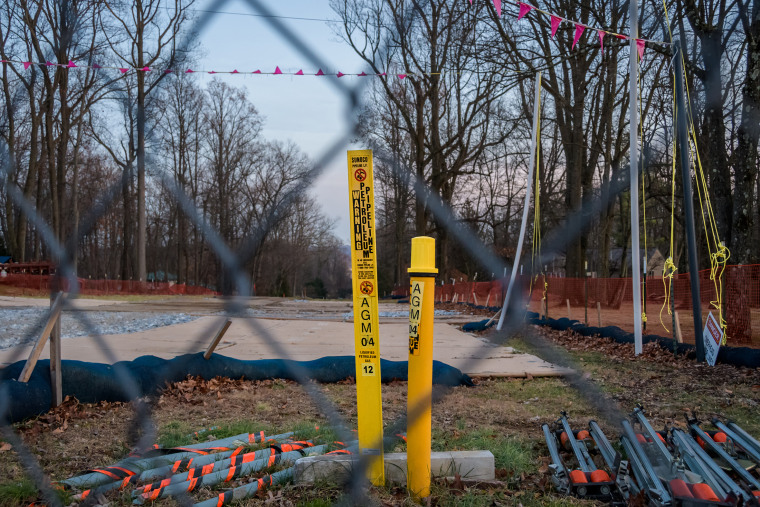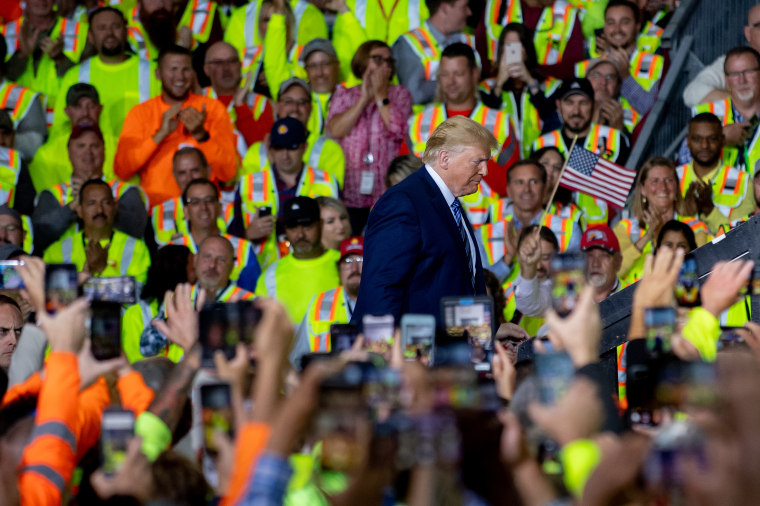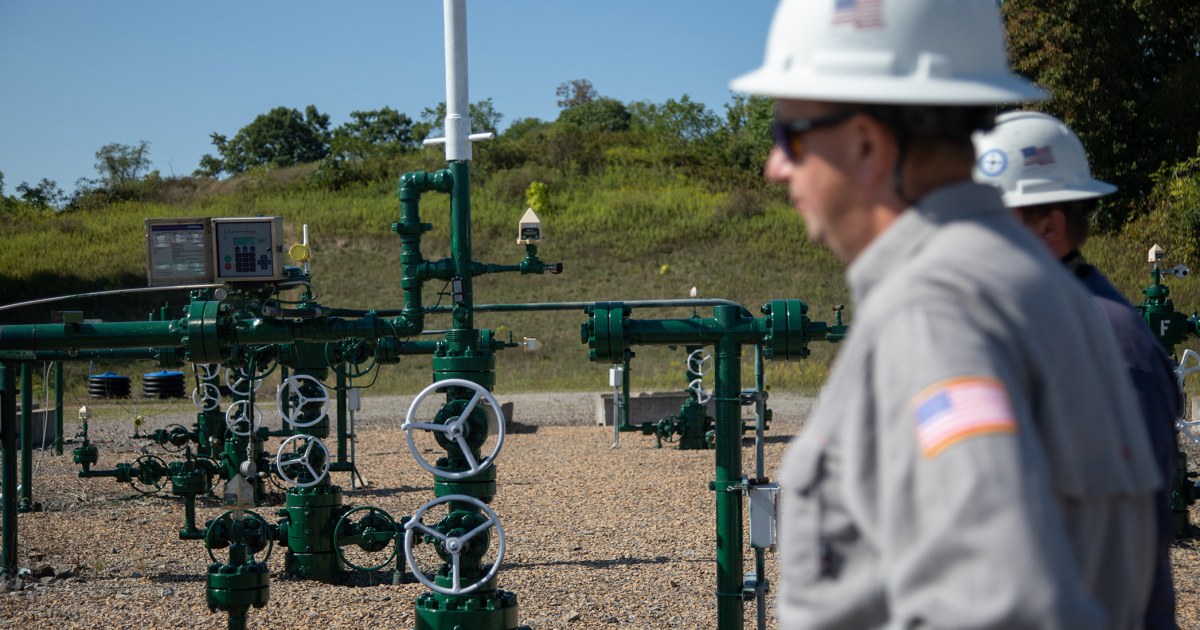HOWE TOWNSHIP, Pa. — John Stewart, vice president of Cameron Energy Co., and Robert Bair, president of the Pennsylvania State Building and Construction Trades Council, are on different sides in the presidential race. But they are on the same side on fracking — a key energy and environmental issue in the biggest battleground state in the election.
Comfortable majorities of Pennsylvania voters support fracking, according to multiple recent polls. But while former President Donald Trump’s base draws almost entirely from that side of the question, Democrats like Vice President Kamala Harris and Pennsylvania’s governor and senators have to balance a coalition that includes supporters and opponents of a major industry in the state.
For Harris, that means getting support from the likes of Bair — who represents 130,000 union construction workers across Pennsylvania and says the U.S. would not be able to function without fracking — as well as Katie Blume, the political and legislative director of Conservation Voters of Pennsylvania, who told NBC News that she believes Pennsylvania lacks strong regulations and that fracking is not critical for a modern society, praising the Biden-Harris administration’s historic climate legislation.

For Trump, it’s simpler: Pennsylvania sits on top of “liquid gold,” he says, and it should “drill, baby, drill.”
Meanwhile, Harris has changed her position on the issue since her first presidential campaign in 2019, now saying she has made it “clear” she would not ban fracking.
Stewart’s company operates about 1,800 oil wells in northwestern Pennsylvania. He said business was better when Trump was in office.
“We could actually plan a budget and know with some predictability that we would be able to meet it. The last several years have been incredibly unpredictable. Inflation is just killing us,” Stewart said.
Beyond inflation, Stewart added that the Biden administration’s ban on exporting liquefied natural gas shut off the global market, caused the prices of natural gas to plummet and created an “immediate impact.”
Stewart said he believes that the substance is missing in conversations about fracking and that the question of whether to ban fracking is “the boogeyman” out there.
“The question is can we survive without fracking in our modern society? The answer is no. … We cannot do without our oil and gas products. We just cannot,” he said.
Bair agrees on the necessity of fracking. But he and his union endorsed the Harris-Walz ticket.
Bair said he gets “very frustrated” when he hears the Trump camp “beating this drum” that Harris wants to end fracking.
“She’s not going to ban fracking. She’s already made that statement publicly,” he said. “She was willing to listen to us and rethink that position. You know, it’s very easy to be part of a problem. The hard work is when you decide you want to be part of the solution.”
He said the Biden-Harris administration has brought union jobs to Pennsylvania’s energy industry.
“The energy policy of this nation has to include fossil fuels in the near term. There’s just no way around it.” he said, adding later, “Fracking and gas are going to be a part of it, and our members are going to be the ones doing it and building.”

Fracking, which is short for hydrofracturing, is the process of pumping water and sand into the ground under pressure to “fracture” a rock. The sand holds the fractures open, which allows for the release of oil and gas trapped inside the rock. The oil and gas are ultimately pumped out of the ground using an oil well.
The actual process of fracking takes about a day. An oil well built on top of a successful frack job can supply oil and natural gas for 40 to 50 years.
Devon Johnson, 23, who is a floorhand on a frac rig at Cameron Energy Co., is supporting Trump because of his “drill, baby, drill” message. Johnson said Trump “never shut down any pipelines like Biden did at the beginning of his presidential term,” referring to the Keystone XL pipeline, an oil pipeline that was supposed to run from Canada down to Nebraska.
Meanwhile, Frank Gray, who works for Steamfitters Union Local 449 out of Pittsburgh and teaches students how to do the piping for fracking, sits on the other side. He has endorsed Harris and said he feels confident she would not do anything to “harm the fracking industry.”
“In 2020, she was the deciding factor in the Senate to vote for the [Inflation Reduction Act] bill. And a part of the IRA bill opened up more land for fracking. So for somebody who’s against fracking, she voted for it,” he said.
Blume, of Conservation Voters of Pennsylvania, was also full of praise of Harris’ record — but she focused on the Biden-Harris administration’s new outlays on financing renewable energy.
“Natural gas is a major contributor to climate change,” Blume said, adding: “Whether you agree or disagree with fracking, the markets are absolutely changing right now, and we need to step up to the plate to make sure we have as diverse an energy portfolio as possible, which is also something that the Biden-Harris climate finance [legislation] have done.”
Gray is aware of the environmental impact of fracking if it is not done safely, which includes polluting the environment, contaminating water supplies and causing tremors on the Earth’s surface. Nevertheless, he said he believes it is possible to frack and make it safe for the environment.
Some companies, like Stewart’s, keep their environmental impacts in mind; he plugs his wells, recycles fracking water and ensures there is new vegetative growth on all exposed oil.
As voters start to cast their ballots, a common sentiment from those working in the industry is the disconnect between the public perception of fracking and what they describe as the public’s need for it. Products like petroleum jelly and fertilizer are examples of items that use the oil extracted from fracking.
To many voters, the process required to generate energy is often invisible.
“People don’t have to get out there and get their hands dirty. That’s, on the one hand, a very, very good thing, but it does generate that disconnect,” Stewart said. “If you’ve never seen what it takes to get this energy out of the ground or these products or this food on our table, you’re not going to understand how it’s done. You’re not going to be able to make good policy decisions about it.”
Gray’s message to those who advocate to ban fracking: “Go without gas. Spend the winter up here with no heat. See how much you’re for it.”

Leave a Reply